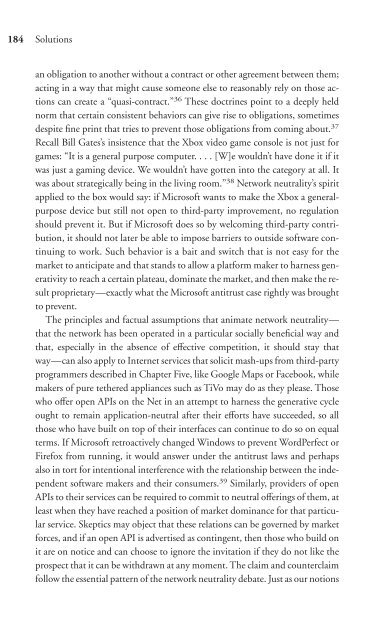Download - Future of the Internet â And how to stop it.
Download - Future of the Internet â And how to stop it.
Download - Future of the Internet â And how to stop it.
You also want an ePaper? Increase the reach of your titles
YUMPU automatically turns print PDFs into web optimized ePapers that Google loves.
184<br />
Solutions<br />
an obligation <strong>to</strong> ano<strong>the</strong>r w<strong>it</strong>hout a contract or o<strong>the</strong>r agreement between <strong>the</strong>m;<br />
acting in a way that might cause someone else <strong>to</strong> reasonably rely on those actions<br />
can create a “quasi-contract.” 36 These doctrines point <strong>to</strong> a deeply held<br />
norm that certain consistent behaviors can give rise <strong>to</strong> obligations, sometimes<br />
desp<strong>it</strong>e fine print that tries <strong>to</strong> prevent those obligations from coming about. 37<br />
Recall Bill Gates’s insistence that <strong>the</strong> Xbox video game console is not just for<br />
games: “It is a general purpose computer. ... [W]e wouldn’t have done <strong>it</strong> if <strong>it</strong><br />
was just a gaming device. We wouldn’t have gotten in<strong>to</strong> <strong>the</strong> category at all. It<br />
was about strategically being in <strong>the</strong> living room.” 38 Network neutral<strong>it</strong>y’s spir<strong>it</strong><br />
applied <strong>to</strong> <strong>the</strong> box would say: if Micros<strong>of</strong>t wants <strong>to</strong> make <strong>the</strong> Xbox a generalpurpose<br />
device but still not open <strong>to</strong> third-party improvement, no regulation<br />
should prevent <strong>it</strong>. But if Micros<strong>of</strong>t does so by welcoming third-party contribution,<br />
<strong>it</strong> should not later be able <strong>to</strong> impose barriers <strong>to</strong> outside s<strong>of</strong>tware continuing<br />
<strong>to</strong> work. Such behavior is a ba<strong>it</strong> and sw<strong>it</strong>ch that is not easy for <strong>the</strong><br />
market <strong>to</strong> anticipate and that stands <strong>to</strong> allow a platform maker <strong>to</strong> harness generativ<strong>it</strong>y<br />
<strong>to</strong> reach a certain plateau, dominate <strong>the</strong> market, and <strong>the</strong>n make <strong>the</strong> result<br />
proprietary—exactly what <strong>the</strong> Micros<strong>of</strong>t ant<strong>it</strong>rust case rightly was brought<br />
<strong>to</strong> prevent.<br />
The principles and factual assumptions that animate network neutral<strong>it</strong>y—<br />
that <strong>the</strong> network has been operated in a particular socially beneficial way and<br />
that, especially in <strong>the</strong> absence <strong>of</strong> effective compet<strong>it</strong>ion, <strong>it</strong> should stay that<br />
way—can also apply <strong>to</strong> <strong>Internet</strong> services that solic<strong>it</strong> mash-ups from third-party<br />
programmers described in Chapter Five, like Google Maps or Facebook, while<br />
makers <strong>of</strong> pure te<strong>the</strong>red appliances such as TiVo may do as <strong>the</strong>y please. Those<br />
who <strong>of</strong>fer open APIs on <strong>the</strong> Net in an attempt <strong>to</strong> harness <strong>the</strong> generative cycle<br />
ought <strong>to</strong> remain application-neutral after <strong>the</strong>ir efforts have succeeded, so all<br />
those who have built on <strong>to</strong>p <strong>of</strong> <strong>the</strong>ir interfaces can continue <strong>to</strong> do so on equal<br />
terms. If Micros<strong>of</strong>t retroactively changed Windows <strong>to</strong> prevent WordPerfect or<br />
Firefox from running, <strong>it</strong> would answer under <strong>the</strong> ant<strong>it</strong>rust laws and perhaps<br />
also in <strong>to</strong>rt for intentional interference w<strong>it</strong>h <strong>the</strong> relationship between <strong>the</strong> independent<br />
s<strong>of</strong>tware makers and <strong>the</strong>ir consumers. 39 Similarly, providers <strong>of</strong> open<br />
APIs <strong>to</strong> <strong>the</strong>ir services can be required <strong>to</strong> comm<strong>it</strong> <strong>to</strong> neutral <strong>of</strong>ferings <strong>of</strong> <strong>the</strong>m, at<br />
least when <strong>the</strong>y have reached a pos<strong>it</strong>ion <strong>of</strong> market dominance for that particular<br />
service. Skeptics may object that <strong>the</strong>se relations can be governed by market<br />
forces, and if an open API is advertised as contingent, <strong>the</strong>n those who build on<br />
<strong>it</strong> are on notice and can choose <strong>to</strong> ignore <strong>the</strong> inv<strong>it</strong>ation if <strong>the</strong>y do not like <strong>the</strong><br />
prospect that <strong>it</strong> can be w<strong>it</strong>hdrawn at any moment. The claim and counterclaim<br />
follow <strong>the</strong> essential pattern <strong>of</strong> <strong>the</strong> network neutral<strong>it</strong>y debate. Just as our notions


